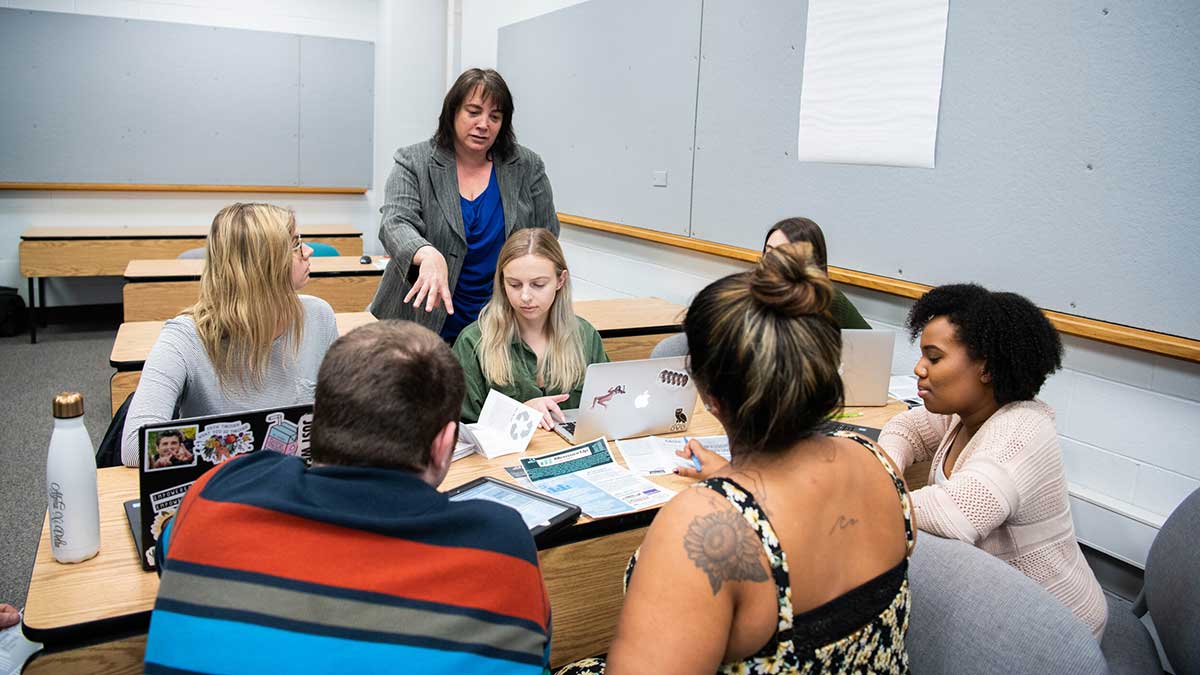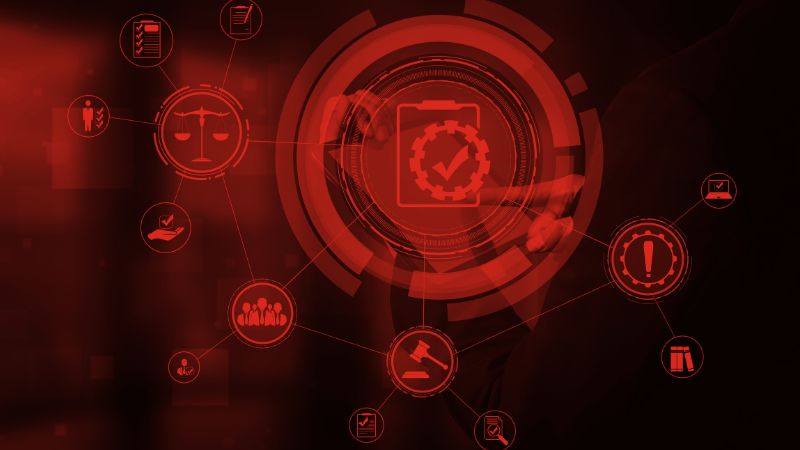Department of Public Policy

Department of
Public Policy
- RIT/
- College of Liberal Arts/
- Academics/
- Academic Departments/
- Department of Public Policy
Contact
Chintana Phetphanh
Sr. Staff Specialist
585-475-5291
cpuwp@rit.edu
Public policy explores the intersection of policy, technology, society, and the natural world. Analysis of these intersections plays a critical role in being able to address the many environmental, social, economic, and technological challenges facing society today and in the future.
The programs and coursework in the Department of Public Policy allow you to combine your interests in science, technology, government, economics, and other social science fields and obtain the skills and knowledge needed to analyze and, ultimately, advocate for policy change in government or private organizations.
Graduate Programs
Our innovative graduate program emphasizes analysis of engineering, science, and technology policy and draws on coursework from a variety of relevant disciplines. Building on RIT’s strength as a technological university, you’ll interact directly with faculty members and researchers who are working on scientific developments and technological innovations that drive new public policy considerations.
Shape public policy in science, tech, energy, and environment through hands-on research.
Learn more about the Science, Technology, and Public Policy MS programMinors and Immersions (Undergraduate)
This immersion provides students with a clear understanding of public policy, the policy process, and policy analysis. Students have the opportunity to develop perspectives on a variety of contemporary public policy issues, especially those that emerge from scientific and technological advancements.
Learn more about the Public Policy Immersion programThe public policy minor provides students with a foundation in the field of public policy and allows them to make connections between public policy and other fields of study. The minor underscores the role of public policy on science and technology-based problems. Students obtain a deeper understanding of public policy and the policy making process, how policy analysis impacts policymaking, and how public policies operate within a number of specific science or technological domains.
Learn more about the Public Policy Minor programBS/MS, Accelerated MS, and Dual Degree Program Options
Learn more about BS/MS in Public Policy, Accelerated MS for science and engineering undergrads, and dual degree options with science, computing, engineering, and other programs within the College of Liberal Arts.
See BS/MS, accelerated MS, and dual degree program options for the Department of Public Policy
Latest News
-
February 10, 2026

RIT College of Liberal Arts Announces Dean’s List for the Fall 2025 Semester
Three hundred and sixty College of Liberal Arts undergraduate students earned a spot on the fall 2025 semester dean's list, including 74 who are double majors with the college.
-
November 7, 2025

As federal aid slows, disaster-prone municipalities face escalating recovery costs, borrowing pressures
ION Analytics speaks to Qing Maio, associate professor in the Department of Public Policy, about the increased denials of disaster aid requests.
-
June 30, 2025

NY wants all vehicles electric, charging them will be challenging
Albany Times Union talks about the complications of moving to all electric with Eric Hittinger, department chair in the Department of Public Policy.
Featured Work and Profiles
-
For a career in medical device innovation, biomedical + policy expertise = a toolbox for transformation
Policy, insurance, pricing, and more—the RIT's master's degree program demystified the complexities of healthcare industry and equipped this recent grad to drive meaningful societal change.
Read More about For a career in medical device innovation, biomedical + policy expertise = a toolbox for transformation -
Biomedical Engineering + Master's in Science, Technology, and Public Policy Equips Recent Grad for Impact
2025 grad now serves as a field service engineer for a company driving the scale of genomic information to advance human health.
Read More about Biomedical Engineering + Master's in Science, Technology, and Public Policy Equips Recent Grad for Impact -
The Thrill of Impactful Research Led Grad to Master's in Science, Tech, and Public Policy
“I have always appreciated the liberal arts and examining pressing issues from many angles. This is why I chose a Public Policy BS degree. I wanted to pursue a master’s degree with Science,...
Read More about The Thrill of Impactful Research Led Grad to Master's in Science, Tech, and Public Policy -
Healthcare Research Prepped Grad to be Successful Med School Applicant
"I initially enrolled in the MS in Science, Technology, and Public Policy to strengthen my skills in writing and public speaking, as these are not big focuses in engineering. The program has provided...
Read More about Healthcare Research Prepped Grad to be Successful Med School Applicant -
Grad Finds Ph.D. Program Success With Skills Developed in Science, Technology, and Public Policy BS/MS
“As a student in the Science, Technology, and Public Policy BS/MS program, I gained an appreciation for the rules, regulations, and policies that govern my field of undergraduate study, biomedical...
Read More about Grad Finds Ph.D. Program Success With Skills Developed in Science, Technology, and Public Policy BS/MS -
BS/MS Grad Values Critical Thinking Skills Developed at RIT
“My time in the BS/MS program set me up to be the well rounded engineer I am today.
Read More about BS/MS Grad Values Critical Thinking Skills Developed at RIT
Alumni Outcomes
- Director, Social Research Center, Public Policy Consultant,
- American University Central Asia, Bishkek, Kyrgyzstan
- Project Manager, Armenia Sustainable Energy Finance Project, International Finance Corporation
- Consultant to World Bank on Energy Issues
- Energy Sector Analyst, Dragon Capital, Ukraine
- Project Manager, Energy Solutions, Oakland, CA
- Ph.D. in Communications at the University at Buffalo
- Information Technology Risk and Audit Management Associate, Royal Bank of Scotland, Stamford, CT
- Fulbright Visiting Scientist – Mechanical Engineering, Energy Studies Institute – National University of Singapore
- Spacecraft Vehicle Engineer, The Boeing Company, Washington, DC
- Energy Efficiency Analyst, Integral Analytics, Cincinnati, OH
- Program Manager, ENERGY STAR Appliance Program, U.S. Environmental Protection Agency
- Ph.D. University of California – Davis, Transportation Policy
- Ed.D. Executive Leadership, St. John Fisher College, Rochester, NY
- Associate Staff Member, Dynamis, Washington, DC
- Program Analyst, Department of Veterans Affairs, Rochester, NY
- Dockets Analyst, Bloomberg, Skillman, NJ
- Assistant Director Research Relations, Rochester Institute of Technology
- Project Manager, Magna Powertrain, Troy, MI
- Training & Support for Deaf in Developing Countries, The Nippon Foundation, Tokyo, Japan
- Assistant Director, Public Safety Initiatives Center, City of Rochester & RIT Collaborative
- Ph.D. Candidate in Energy and Environmental Policy at University of Delaware
- Project HOPE Director, DEAF, Inc., Boston, MA
- Researcher, Data Analyst, GIS Specialist, Energy & Environmental Research Associates
- Senior Crime Research Specialist, Rochester Police Department
- International Program Manager, Center for Energy & Resource Development, American University at Kosovo, Rochester Institute of Technology
- Program Coordinator, Huther-Doyle Memorial Institute, Rochester, NY
- Ph.D., Water Resources Engineering, SUNY College of Environmental Science & Forestry
- Energy Efficiency & Conservation Advisor, U. S. Department of State, Washington, DC
- Research Assistant, United States Senate, Washington, DC
Career, Application, and Thesis Resources for Students
Career and Networking Resources
- Science Policy Job X (formerly Twitter) feed
- Engaging Scientists and Engineers in Policy Coalition
- Daybook
- STPI’s Policy Fellowship Program
- STPI’s Summer Associate Program
- NSF Summer Scholars Internship Program
Forms and Policies












